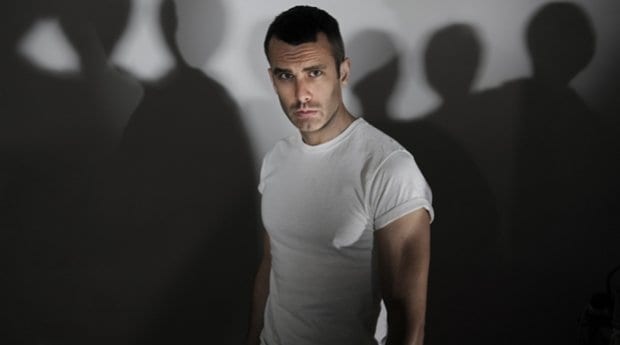The Hidden Cameras Carpe Jugular was directed by Kai Staenicke.
Kai Staenicke
For the past decade, The Hidden Cameras could be relied upon to produce music videos of the crafty, campy and lo-fi variety.
However, for the Toronto-bred collective’s sixth studio album, Age, singer/songwriter Joel Gibb muses on mortality and maturity; the minor key melodies, riffs and rhythms are much darker than the sunny orchestral pop tunes for which the band is best known.
To direct the video for their latest single, “Carpe Jugular,” Gibb turned to Berlin-based filmmaker Kai Staenicke, who helmed the slick cinematic short for the Cameras’ song “Gay Goth Scene.”
The clip, which picked up a few awards on the short film festival circuit, follows a waifish, teenaged goth whose relentless schoolyard torment climaxes to the demonic wails of guest vocalist Mary Margaret O’Hara.
Gibb first saw Staenicke’s work while acting as a juror for the Oslo Gay and Lesbian Film Festival in 2012. He found the shorts emotionally insightful and reached out to the director, who felt similarly about the Cameras’ music.
“They’ve got a way of including these dramatic elements in their songs that immediately create visuals in my mind,” Staenicke says. “I remember listening to ‘Gay Goth Scene’ for the first time and just getting this deep feeling of pain and sadness and anger. And yet, their songs are so varied, and every song can put you in a different mood.”
While “Gay Goth Scene” tackled teenage bullying, Staenicke’s treatment for the dance-y “Carpe Jugular” represents another — perhaps less visible — social scourge: dancefloor drama.
The video turns an austere-looking nightclub (which is actually two locations: a theatre called Schaubühne and the club Brunnen70, both in Berlin) into a literal battleground, as wordless flirtations are rebuffed with bloody assaults and heart-ripping histrionics.
“I thought a lot about how people behave in clubs and on the dancefloor and how it can be frustrating. It’s this microcosm of wanting and rejecting, and it can be hurtful sometimes,” Staenicke says. “We’ve all been there: wanting people that don’t want us, being wanted by someone we don’t want.”
“I like to think of the song as observing the politics of the dancefloor through a Darwinian lens and a Freudian aperture, all with hidden cameras,” Gibb says. “I can relate to almost every situation in the video and none of them at the same time. It’s about how we perceive ourselves and others: reality versus perception.”
With all this pain and anguish flooding out on Age, Gibb is ready to return to more lighthearted fare. “I have been writing songs, as always, and am finishing up a country record that will come out sometime next year,” he says. “It really will be the polar opposite of Age, a sweet and sentimental record.”
Watch The Hidden Cameras’ “Carpe Jugular” video.

 Why you can trust Xtra
Why you can trust Xtra


